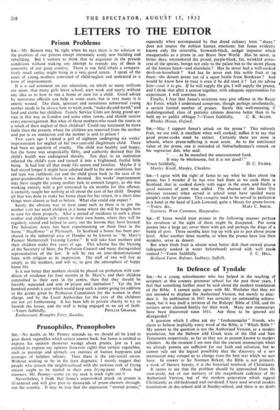LETTERS TO THE EDITOR
Prison Problems
Sta,—Mr. Benson may be right when he says there is no solution to the problem of our prisons except immensely costly new building and rebuilding. But I venture to think that to acquiesce in the present conditions without making any attempt to remedy any of them is unworthy of our great country. There is one field where a compara- tively small outlay might bring in a very-good return. I speak of the cases of young mothers convicted of child-neglect and sentenced to a term of imprisonment.
It is a sad comment on our education, on which so many millions are spent, that many girls leave school, start work and marry _without any idea as to how to run a home or care for a child. Good advice by numerous officials can help in some cases, but in very many it is utterly wasted. The slack, ignorant and sometimes subnormal young mother needs to be shown how to wash, cook, "make-do,-and-mend," and feed and clothe her children. Family Service Units are doing grand ser- vice in this way in London and some other towns, and should receive every encouragement. But what of those mothers who reach the courts as a result of their neglect of their children? Could any treatment be more futile than the present, where the children are removed from the mother and put in an institution and the mother is sent to prison ? Two years ago I visited a girl of eighteen undergoing six weeks' imprisonment for neglect of her two-year-old illegitimate child. There had been no question of cruelty. The child was healthy and happy, but the home was unspeakably filthy, and authority decreed that the child's health was endangered thereby. Ten days in an institution infected the child's eyes and turned it into a frightened, fretful little being. It had lost all that made life secure and familiar. Maybe if it had stayed longer it might have adapted itself to the new conditions, but red tape was ruthlessly cut and the child given back to the care of its great-grandmother to whom it was devoted. Six weeks' imprisonment may have taught the young mother how, to commit forgery, as she was working entirely with a girl sentenced to six months for this offence; it certainly taught her nothing at all about the care of her child. Despite all that was done to make her home clean for her return, in a short time things were almost as bad as before. What else could one expect ? Surely the obvious way to treat cases such as these is to put the mother with her small children in a home where she will be taught how to care for them properly. After a period of residence in such a place mother and children will return to their own home, where they will be regularly visited and helped to carry out the lessons they have learned. The Salvation Army has been experimenting on these lines in the home " Mayflower" at Plymouth. In Scotland a house has been pur- chased in the industrial area of Dundee to be known as "St. Mary's Pioneer Mothercraft Training Centre." It will take four mothers and their children under five years of age. This scheme has the blessing of the Secretary of State, the Probation Council and many distinguished representatives of the law. It will be run on inter-denominational lines, with religion as its inspiration. The staff of two will live as simply as the mothers, and will try to give the atmosphere of happy home life.
Is it not better that mothers should be placed on probation with con- dition of residence for four months at St. Mary's, and their children committed to their care in the centre, than that they should be forcibly separated and sent tob prison and institution ? Yet the few hundred pounds a year which would keep such a centre going (in addition to the grants given by Probation Committees for the women in their charge, and by the Local Authorities for the care of the children) are not yet forthcoming. It has been left to private charity to try to furnish the house, and the staff is being engaged as an act of faith.
—Yours faithfully, PHYLLIS GRAHAM. Forbescourt, Broughty Ferry, Dundee.


























 Previous page
Previous page